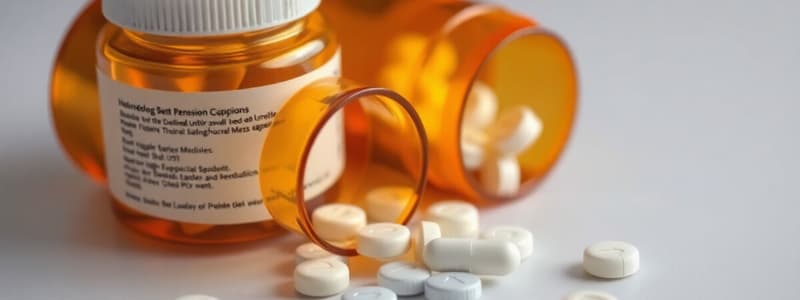Podcast
Questions and Answers
What is the main effect of dihydropyridines on heart function?
What is the main effect of dihydropyridines on heart function?
- Increase heart rate
- Decrease contractility (correct)
- No effect on contractility
- Increase conduction speed
Which of the following medications specifically causes constipation as a side effect?
Which of the following medications specifically causes constipation as a side effect?
- Diltiazem
- Lisinopril
- Verapamil (correct)
- Telmisartan
What is the primary mechanism of action for ACE inhibitors?
What is the primary mechanism of action for ACE inhibitors?
- Block beta receptors
- Activate kinins
- Inhibit angiotensin II production (correct)
- Increase aldosterone levels
Which condition is a potential side effect of ARBs?
Which condition is a potential side effect of ARBs?
Which of the following statements about ACE inhibitors is true?
Which of the following statements about ACE inhibitors is true?
What is a distinguishing feature of ARBs compared to ACE inhibitors?
What is a distinguishing feature of ARBs compared to ACE inhibitors?
In cases of hypertension, which class of drugs is likely to cause hyperkalemia?
In cases of hypertension, which class of drugs is likely to cause hyperkalemia?
Which adverse effect is commonly associated with Lisinopril?
Which adverse effect is commonly associated with Lisinopril?
What is the primary mechanism by which Thiazide diuretics like Chlorothiazide reduce blood pressure?
What is the primary mechanism by which Thiazide diuretics like Chlorothiazide reduce blood pressure?
Which side effect is associated with the use of Spironolactone?
Which side effect is associated with the use of Spironolactone?
What is a common use for K+ sparing agents like Amiloride?
What is a common use for K+ sparing agents like Amiloride?
What is a notable effect of Dihydropyridine calcium channel blockers such as Amlodipine?
What is a notable effect of Dihydropyridine calcium channel blockers such as Amlodipine?
Which condition is most commonly associated with hyperuricemia?
Which condition is most commonly associated with hyperuricemia?
What effect does Indapamide have in kidney function?
What effect does Indapamide have in kidney function?
What condition can lead to the development of hypokalemia when using Chlorothiazide?
What condition can lead to the development of hypokalemia when using Chlorothiazide?
Which side effect is NOT commonly associated with Dihydropyridines?
Which side effect is NOT commonly associated with Dihydropyridines?
What is the mechanism of action for Acetazolamide?
What is the mechanism of action for Acetazolamide?
Which side effect is common to both Loop Diuretics and Thiazides?
Which side effect is common to both Loop Diuretics and Thiazides?
What is a contraindication for the use of Hydrochlorothiazide?
What is a contraindication for the use of Hydrochlorothiazide?
Which electrolyte is decreased by both Acetazolamide and Furosemide?
Which electrolyte is decreased by both Acetazolamide and Furosemide?
Which agent has the greatest diuretic effect?
Which agent has the greatest diuretic effect?
What is a primary indication for the use of Furosemide?
What is a primary indication for the use of Furosemide?
Which diuretic leads to the retention of bicarbonate in the lumen?
Which diuretic leads to the retention of bicarbonate in the lumen?
Which of the following diuretics would be contraindicated in a patient with hypokalemia?
Which of the following diuretics would be contraindicated in a patient with hypokalemia?
Flashcards
Dihydropyridines
Dihydropyridines
Calcium channel blockers that specifically target the L-type calcium channels in vascular smooth muscle and the heart (AV/ SA node). They reduce contractility, heart rate, and conduction.
ACE Inhibitors
ACE Inhibitors
A class of drugs that block the angiotensin converting enzyme (ACE), thus preventing the formation of angiotensin II. They reduce aldosterone release, decrease systemic vascular resistance, and increase bradykinin levels.
ARBs (Angiotensin Receptor Blockers)
ARBs (Angiotensin Receptor Blockers)
A class of drugs that block the angiotensin II type 1 (AT1) receptor, preventing the effects of angiotensin II on blood vessels and other tissues. They lower blood pressure, reduce aldosterone production, and decrease systemic vascular resistance.
Verapamil
Verapamil
Signup and view all the flashcards
Diltiazem
Diltiazem
Signup and view all the flashcards
Non-Selective Calcium Channel Blockers
Non-Selective Calcium Channel Blockers
Signup and view all the flashcards
Dry Cough
Dry Cough
Signup and view all the flashcards
Tachycardia
Tachycardia
Signup and view all the flashcards
Thiazide diuretics
Thiazide diuretics
Signup and view all the flashcards
Amiloride
Amiloride
Signup and view all the flashcards
Spironolactone
Spironolactone
Signup and view all the flashcards
Peripheral edema
Peripheral edema
Signup and view all the flashcards
Gum swell
Gum swell
Signup and view all the flashcards
Headache, dizziness, flushing
Headache, dizziness, flushing
Signup and view all the flashcards
Early distal tubule
Early distal tubule
Signup and view all the flashcards
Acetazolamide MOA
Acetazolamide MOA
Signup and view all the flashcards
Furosemide MOA
Furosemide MOA
Signup and view all the flashcards
Hydrochlorothiazide MOA
Hydrochlorothiazide MOA
Signup and view all the flashcards
Diuretic Mechanism
Diuretic Mechanism
Signup and view all the flashcards
Acetazolamide Contraindications
Acetazolamide Contraindications
Signup and view all the flashcards
Furosemide Contraindications
Furosemide Contraindications
Signup and view all the flashcards
Hydrochlorothiazide Contraindications
Hydrochlorothiazide Contraindications
Signup and view all the flashcards
Diuretic Indications
Diuretic Indications
Signup and view all the flashcards
Study Notes
Hypertension Medications
- Diuretics:
- Carbonic anhydrase inhibitors (e.g., Acetazolamide): Reduce sodium bicarbonate reabsorption, lowering blood volume and pressure. Side effects include hypokalemia (low potassium) and metabolic acidosis. Indications include glaucoma and congestive heart failure, contraindicated in pregnancy and renal insufficiency.
- Loop diuretics (e.g., Furosemide, Torsemide): Inhibit sodium chloride reabsorption in the loop of Henle leading to increased excretion, greater diuretic effect. Side effects include hypokalemia, hyperuricemia, and hypocalcemia. Indicated for hypertension and congestive heart failure. Contraindicated in pregnancy.
- Thiazides (e.g., Hydrochlorothiazide, Indapamide, Chlorothiazide): Inhibit sodium chloride reabsorption in the distal convoluted tubule. Side effects include hypokalemia, hyperuricemia, and hypercalcemia. They're indicated for hypertension, but can have side effects like hyperlipidemia and photosensitivity. Contraindicated in pregnancy and renal insufficiency.
- Potassium-Sparing Diuretics (e.g., Amiloride, Spironolactone): These agents reduce sodium reabsorption and increase potassium excretion. Amiloride blocks sodium channels, while Spironolactone is an aldosterone antagonist. Side effects includes hyperkalemia, metabolic acidosis, and, for Spironolactone, gynecomastia and menstrual irregularities. Indicated for hypertension alongside other diuretics, and in conditions like liver cirrhosis and congestive heart failure. Contraindicated in pregnancy; avoid in patients with renal disease or anuria.
Calcium Channel Blockers
- Dihydropyridines (e.g., Amlodipine, Felodipine): Inhibit L-type calcium channels in vascular smooth muscle. This leads to peripheral vasodilation, lowering blood pressure. Side effects include peripheral edema, gum swelling, headaches, dizziness, and flushing. Indications include hypertension and angina pectoris; also useful for heart failure. Commonly contraindicated in patients with hypotension.
- Non-Dihydropyridines (e.g., Verapamil, Diltiazem): These act on both vascular smooth muscle and the heart's conducting system (AV/SA node). This leads to decreased heart rate and slowed conduction, and also vasodilation. Side effects include bradycardia, arrhythmias and AV block. They're useful for hypertension and arrhythmias but carry risks like AV block and bradycardia.
Renin-Angiotensin-Aldosterone System (RAAS) Inhibitors
- ACE Inhibitors (e.g., Perindopril, Lisinopril, Captopril, Ramipril): Inhibit angiotensin-converting enzyme, reducing angiotensin II production. This leads to vasodilation and reduced sodium retention. Side effects include dry cough, hyperkalemia, and angioedema. Used to treat hypertension and heart failure; pregnancy contraindication.
- ARBs (e.g., Telmisartan, Losartan, Candesartan): Block angiotensin II receptors, also reducing angiotensin II's effects. Side effects include hyperkalemia. They're similarly indicated for hypertension and heart failure. Contraindicated in pregnancy.
Antiplatelets
- TXA2 Inhibitors (e.g., Aspirin): Irreversibly inhibit cyclooxygenase, reducing thromboxane A2 formation. Side effects include bleeding. Indications include antiplatelet therapy, fever and pain relief. Contraindicated in patients with stomach ulcers, asthma, or allergies.
- P2Y12 Inhibitors (e.g., Clopidogrel, Ticagrelor, Prasugrel): Block ADP receptors on platelets, reducing platelet aggregation. Side effects include bleeding. Indications include antiplatelet therapy after MI, and for atrial fibrillation.
- GP2A/3B Inhibitors (e.g., Tirofiban, Abciximab, Eptifibatide): Bind to platelet GPIIb/IIIa receptors, inhibiting fibrinogen binding and platelet aggregation. Side effects include bleeding. Uses are for antiplatelet therapy, especially in situations like unstable angina and NSTEMI.
Anticoagulants
- Heparin (unfractionated and low molecular weight): Inactivates clotting factors via antithrombin. Side effects include bleeding and, in some cases, heparin-induced thrombocytopenia (HIT). Indications include preventing thrombotic events, DVT, PE, and atrial fibrillation. Contraindicated in patients with a history of HIT or hypersensitivity to heparin.
- NOACs (e.g., Rivaroxaban, Apixaban, Dabigatran): Directly inhibit specific clotting factors, primarily factor Xa or thrombin. Side effects include bleeding. Useful in situations like preventing DVT, PE, and stroke. Contraindications include bleeding disorders or liver dysfunction.
- Vitamin K Antagonists (e.g., Warfarin): Interfere with Vitamin K-dependent clotting factor synthesis, reducing coagulation. Side effects include bleeding and interactions with various medications. Indications include anticoagulant therapy in conditions like DVT, PE, and atrial fibrillation, though it's often used in cases with a history of clots. Avoid in patients with bleeding disorders or liver impairments.
- Thrombolytics (e.g., Alteplase, Reteplase, Urokinase, Streptokinase): Dissolve existing blood clots, activating plasmin. Side effects include bleeding, intracranial hemorrhage, and allergic reactions. Commonly used for acute myocardial infarction (MI) or ischemic stroke. Contraindicated in patients with a history of intracranial neoplasms, recent ischemic stroke, major surgery within 72 hours.
Diabetes Medications
- Biguanides (e.g., Metformin): Reduce hepatic glucose production, increase insulin sensitivity, and increase glucose uptake in muscle. Side effects include lactic acidosis (renal insufficiency concern), impaired vitamin B12 absorption . First-line treatment.
- Sulfonylureas (e.g., Glimepiride): Stimulate insulin release from beta cells. Side effects include hypoglycemia, weight gain.
- Meglitinides (e.g., Repaglinide): Similar to sulfonylureas but faster-acting and shorter-lasting. Side effects include hypoglycemia.
- DPP-4 Inhibitors (e.g., Sitagliptin, Linagliptin): Increase incretin levels, prompting more insulin release. Side effects include hypoglycemia, urinary infections, and pancreatitis.
- GLP-1 Agonists (e.g., Exenatide, Liraglutide): Mimic the effects of incretins, promoting insulin release and reducing glucagon release. Side effects include nausea, vomiting, and pancreatitis.
- SGLT2 Inhibitors (e.g., Canagliflozin, Dapagliflozin, Empagliflozin): Reduce glucose reabsorption in the kidneys. Side effects include increased urinary glucose (glucosuria), dehydration, and increased urinary tract infections.
- Alpha-Glucosidase Inhibitors (e.g., Acarbose): Delay carbohydrate absorption in the intestine. Side effects include gastrointestinal issues like diarrhea and bloating.
Hyperlipidemia Medications
- Statins (e.g., Lovastatin, Simvastatin, Pravastatin): Reduce cholesterol by inhibiting HMG-CoA reductase. Side effects include liver damage, muscle pain. Often first-line treatment, but adverse effects limit use in some patients.
- Ezetimibe: Inhibits cholesterol absorption. Side effects include liver issues. Consider for patients who don't tolerate or respond to statins.
- PCSK9 Inhibitors (e.g., Evolocumab, Alirocumab): Increase LDL receptor production. Side effects are generally minor. Useful for patients with high LDL who don't respond or tolerate other therapies and high LDL.
- Bile acid sequestrants (e.g., Cholestyramine, Colestipol, Colesevelam): Increase bile acid excretion. Side effects include constipation, bloating.
- Fibrates (e.g., Gemfibrozil, Fenofibrate): Increase lipoprotein lipase activity and lower triglycerides. Side effects include muscle pain. Useful for high triglyceride levels.
- Omega-3 Fatty Acids (e.g., Fish Oil): Increase HDL and lower triglycerides, with fewer and usually milder side effects.
Studying That Suits You
Use AI to generate personalized quizzes and flashcards to suit your learning preferences.




